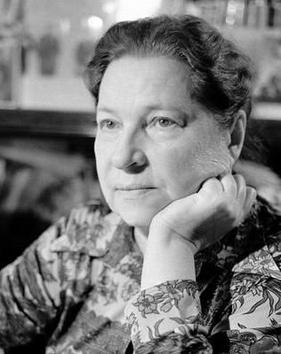1906 - 1981
By: Mv | Date Added:

Agniya Lvovna Barto was a Soviet poet and children’s writer of Russian Jewish origins. Most of Agniya Barto’s poems are written for preschool and elementary school children. Her poems are among the first ones Russian children encounter, as they are easy to read and to remember. The author addresses the child directly using simple language. Agniya Barto was born in 1906 in Kovno into an educated Russian Jewish family and her birth name was Gitel Leybovna Volova. As many Jews did in the Soviet Union, she found it prudent to modify her name to be more Russian sounding. Agniya’s father was a veterinary doctor and her mother took care of the house. Agniya Barto attended both a regular school and a ballet school. She enjoyed poetry and tried to write in imitation of Anna Akhmatova and Vladimir Mayakovsky. At her graduation ceremony from ballet school, she read some of the poems that she wrote herself. Anatoly Lunacharsky was present at the ceremony and remarked that, instead of becoming a ballerina, she should be a professional poet. According to legend, despite the fact that all of Barto's poetry at that time was about love and revolution, Lunacharsky predicted that she would become a famous children's poet. Agniya married Italian-Russian electrical engineer and poet Pavel Barto. Some of her children's poems were published under two names: Agniya Barto and Pavel Barto. In 1925 she published her first books: Chinese boy Wan-Lin and Mishka the Petty Thief. Subsequently, she published The First of May (1926) and Brothers (1928) which received a positive review from Korney Chukovsky. After publishing a book of poetic miniatures for toddlers entitled Toys in 1936, she suddenly became one of the most popular children's authors, with millions of published copies. During World War II, she wrote patriotic anti-Nazi poetry. She also worked as a Western Front correspondent for the newspaper Komsomolskaya Pravda. During the 1960s, Barto worked in an orphanage that inspired her to publish the poem Zvenigorod (written in 1947, first published in 1966). For nine years Agniya was the anchor of the radio program Find a Person, which helped people find family members lost during World War II. During that time, she helped to reunite no fewer than a thousand families. She wrote a book about it in 1966. In 1977, she published Translations from the Children's Language composed of her translations of poetry written by children of different countries. Agniya Barto was also the author of the scripts for the children's films Foundling (1940), An Elephant and a Rope (1945), Alyosha Ptitsyn builds his character (1953), 10,000 Boys (1962), and Find a Person (1973). To this day, Agniya Barto remains one of the most popular children’s poets for the youngest set, especially her collection Toys, read and recited by many Russian children.
Share your thoughts on this story with us. Your comments will not be made public.
Email
Copyright ©2016 - Design By Bureau Blank